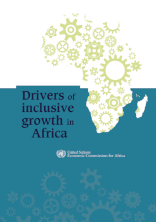Drivers of inclusive growth in Africa

Africa’s growth performance during the period 2000-2015 was the second-fastest in the world, following East and South Asia, which rekindled hope for prosperity. Income inequality, however, was the second-highest, following Latin America. This has raised concerns over whether the recent growth is inclusive. There is increasing attention on the issue of inclusive growth both in academic and policy circles, with several definitions and alternate measurements, which suggest a lack of unanimity. The authors define inclusive growth as broad-based growth in income that is shared by every member of society (i.e., growth benefitting everyone in the economy) or growth that reduces inequality, or a combination of both. The level of inclusive growth in Africa is assessed and the drivers of inclusive growth investigated at an aggregate level. Using the unified measure of inclusive growth, the level of inclusivity of growth in Africa was computed. The authors’ findings indicate that growth in Africa is slightly inclusive, with an inclusive growth rate of 0.246. The estimation results indicate that investment, government spending, loose monetary policy, competitive and efficient financial institutions, better information and communications technology (ICT) infrastructure and better institutions foster inclusive growth in Africa. Consistent with the conditional convergence hypothesis that implies that poorer economies tend to grow faster than richer ones, the authors find negative and statistically significant effects of initial gross domestic product per capita on inclusive growth. Overall, the econometric results provide evidence on the role of macroeconomic policies (fiscal and monetary) and on the role of good institutions and governance, as well as ICT, in affecting inclusive growth in Africa. This implies that fostering inclusive growth is amenable to macroeconomic policies and other development interventions. Further research is recommended in order to focus on disaggregating the channels through which both fiscal and monetary policies affect inclusive growth.